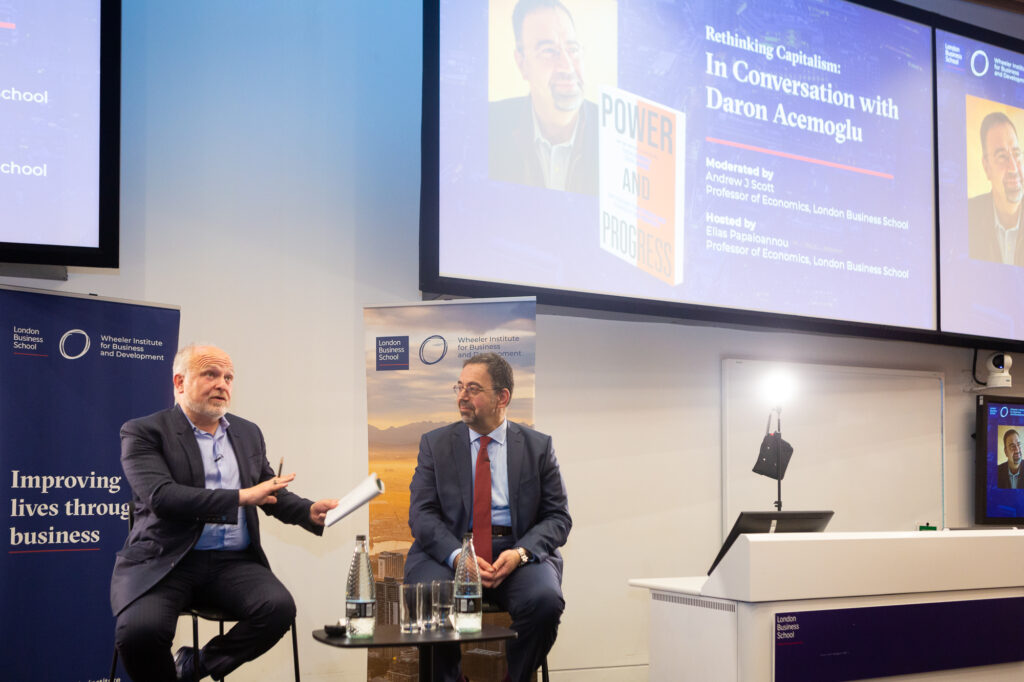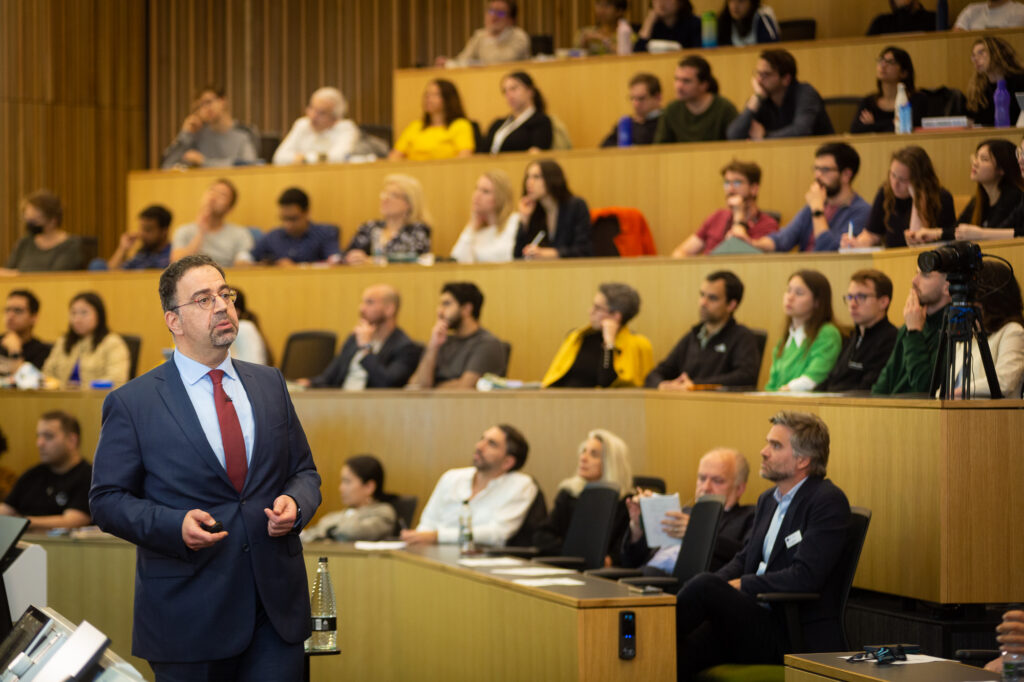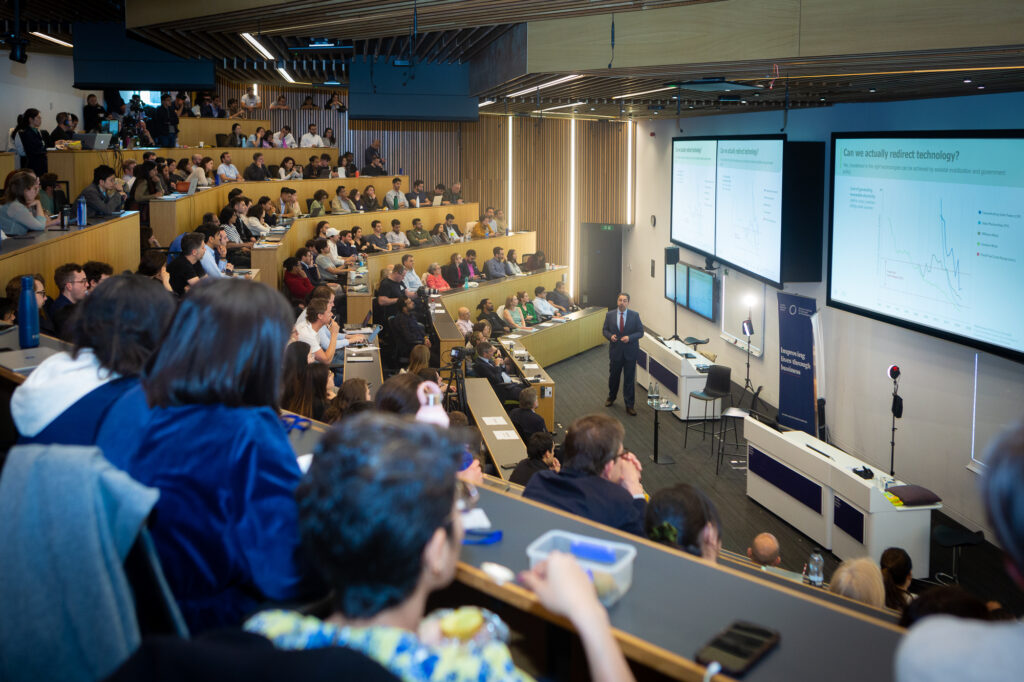The Wheeler Institute at the London Business School was proud to host Daron Acemoglu for a presentation on his and Simon Johnson’s latest book, Power and Progress: Our Thousand-Year Struggle Over Technology and Prosperity, followed by a discussion with London Business School professor Andrew J Scott.
The event, attended by more than 600 people in person and virtually, began with opening remarks from Elias Papaioannou, London Business School Professor of Economics and Co-Academic Director of the Wheeler Institute.
Professor Papaioannou went on to introduce Daron Acemoglu. Acemoglu, a Professor of Economics at the Massachusetts Institute of Technology (MIT), is known for his ground-breaking research across a variety of topics in economics and social sciences; from the role of institutions on long-run development to how technological innovation affects economic growth – which was the central topic of the event’s discussion. Professor Acemoglu also has strong ties to London Business School and was awarded an honorary doctorate from the School in 2018 in recognition of his contributions to the field of economics. In addition to his academic work, Acemoglu is an accomplished writer with multiple bestselling books, including Why Nations Fail and The Narrow Corridor.
Overview of Daron’s latest book Power and Progress
Following Professor Papaioannou’s opening remarks, Acemoglu began what would be his first public in-person presentation of his latest book, Power and Progress, now available in the United Kingdom.
The book examines both historical and contemporary evidence to explore the relationship between technological breakthroughs and social and economic progress. While one would assume advancements in technology over history would automatically result in improvements in broader society, it was often not the case. From the European Middle Ages with breakthroughs in agriculture (e.g., windmills for grain production) to the cotton gin in southern United States during the pre-Civil War era to modern times with the proliferation of digital technologies, the value generated from technological breakthroughs did not often go to average citizenry but to a small number of ruling elites.
According to Acemoglu and Johnson, the absence of new tasks created by technologies designed solely to automate human work will not result in increased labour productivity; rather it will simply dislocate the human workforce and redirect value from labour to capital. On the other hand, technologies that not only enhance efficiency but also generate new tasks for human workers have a dual advantage of increasing marginal productivity and yielding more positive effects on society as a whole.
To illustrate this point, Acemoglu gave the example of Ford Motor Company’s mechanisation of the automotive factory which at the same time as automating work created new tasks for its workers. These technologies, he said, focused not on replacing humans with “machine intelligence” but enabling them with technologies that had the characteristics of “machine usefulness.”
As breakthroughs in generative artificial intelligence (AI) and large language models thrust the world into the era of AI, more should be done to ensure a bright future where these technologies do not serve to further displace labour but instead enable a more productive workforce.
To accomplish this, Acemoglu and Johnson suggest three things must happen:

- Change the narrative: A change in the global narrative on these technologies is needed; a narrative that moves from the blind techno-optimism fixated on replacing humans with machines to one framed around empowering and enabling humans to be more productive.
- Create countervailing powers: Given the growing control of a few private sector corporations over technologies like AI, the presence of countervailing powers, such as regulatory institutions and trade unions, may be needed to ensure that citizens’ and workers’ voices are heard and interests taken into account.
- Redirect technological change to enhance human capabilities: New technologies, particularly AI, should not focus solely on automating tasks previously done by humans and instead seek to empower and enable workforces to be more productive. For AI, this could mean serving to enhance human decision-making by filtering and curating information. While redirecting technological innovation for the benefit of society sounds like a daunting task, Acemoglu cited the success of government subsidies and incentives in driving down the cost of renewable energy, as a recent example.
Discussion with Professor Andrew Scott
Following those conclusions, Acemoglu joined London Business School professor and former colleague Andrew Scott for further discussion on topics covered in the book.
The risk of bling techno-optimism and the leap from technological progress to economic and social progress
The discussion began with a question about the relationship between technological progress and economic and social advancements. Acemoglu argued that the former does not always result in the latter. Often, the term ‘progress’ is misleading, considering the large gap that exists between technological advancements and true societal growth. Technological progress is neither a prerequisite nor a guaranteed path to social progress.
Responding to the question of whether we live in an unusually techno-optimistic era, Acemoglu spoke about how those in charge of technology deployment, and how they often frame their actions in the context of the “common good”. There seems to be a consensus that the “right” use of technology will lead to progress. However, this perspective is subject to interpretation and, more often than not, it aligns with those who stand to benefit most from the technology (e.g., the management who saves on labour costs due to automation).
That is not to discount the value that technologists provide to society. Acemoglu acknowledged the undeniable appeal of our current technological landscape, citing Silicon Valley as a source of remarkable inspiration. However, he warned that its influence could also be problematic.
“So-so automation’’ and technology’s unfulfilled promise of productivity gains

The discussion then turned to the prevailing assumption that leaders around the world have, which asserts that technology fosters productivity growth. While there is a widespread perception that technology is a driving force of productivity, the reality of stagnant productivity growth suggests otherwise. Acemoglu offered an explanation, suggesting that “so-so automation” — technology that provides marginal improvements from automation but not transformative change — might be contributing to this lackluster growth in marginal productivity. Acemoglu explained that when automation is used excessively, valuable opportunities for learning and creativity that human labor brings are cast aside. As a result, the aggregate productivity of economies might decrease, despite individual companies seeing minor upticks in profitability.
He further clarified this by comparing the advent of self-checkout kiosks in grocery stores to the Ford Motor Company’s revolutionary approach to mechanisation. While self-checkout kiosks might offer some convenience, they are unlikely to drive a productivity boom. Conversely, Ford introduced better machinery and radically transformed work processes, leading to significant productivity enhancements.
ChatGPT and automation versus augmentation
The conversation shifted to a discussion on automation versus augmentation – enabling workers to perform more tasks and engage in higher value-added activities. The current technological approach, Acemoglu argues, tends to focus too much on increasing average productivity through automation at the expense of marginal productivity. For the latter, the emphasis should be on augmentation technologies that enhance the capacity of workers to contribute more significantly to the production process. This strategy could potentially increase the marginal product of labor, which refers to the additional output that can be produced by employing one more unit of labor while keeping other inputs constant.
In responding to a question about where OpenAI’s ChatGPT falls on the spectrum from automation to augmentation, Acemoglu distinguished ChatGPT from the broader category of large language models. These models have the potential to filter and provide relevant information in a context-rich environment. He argued that these tools could be highly productive if used to create new tasks and enhance human productivity.
One potential application he says would be providing better information to human decision-makers. Given the significant growth in knowledge work, accessing reliable information has become increasingly important.
However, Acemoglu voiced concerns over the existing architecture and objective of ChatGPT, which was developed and deployed quickly by OpenAI. He argued that the model’s design was not particularly suited to facilitating reliable information access for human cognition and decision-making. It does not provide clarity on its reasoning, neither does it verify the reliability of the information it shares. This authoritative “take it or leave it” approach could be detrimental to human cognition, he argued.
The driving forces behind the dominant vision of “machine intelligence”
Recent developments in artificial intelligence are dominated by a view that humans can and should be replaced by “machine intelligence”, rather than enabled by technologies with “machine usefulness” that can be used alongside humans to increase their productivity.

Next in the discussion, the reasons behind this dominating perspective on technology were explored and examined. Acemoglu shared that in his view this vision is the result of two factors. Firstly, he pointed to the “catchiness” of a compelling vision, as seen with Alan Turing’s conceptualisation of computers as autonomous, intelligent machines. This vision, he says, is not only influential but also changes our perception of ourselves, leading us to view humans as being similar to computing machines and therefore replaceable.
Secondly, he emphasised the power of persuasion. Those with charismatic personalities, compelling narratives, and track records of success have a significant influence over the dominant narratives in tech. Elon Musk is one such example – an individual whose past success and looming public persona have given him a disproportionate influence on technological narratives.
In the context of this dominating vision and its implications for technologies like large language models replacing labour, the discussion turned to the potential of social movements and trade unions to play a larger role in the future. Acemoglu cited several recent successful examples of trade unions, such as the recent strikes from the Writers Guild of America. He added, however, that future labour movements in a world with the widespread use of automation technology will face an uphill battle in ensuring basic rights for their workers. The prevailing “vision oligarchy”, which has a firm grip on the public imagination, will pose a significant challenge.
The evolution of business education
Finally, Acemoglu was asked about the impact of business school education, especially MBA programmes, on CEOs’ decision-making and the overall business landscape. The question stemmed from research findings indicating that CEOs who received their MBAs in the 1980s and ‘90’s tend to cut costs more, not necessarily raise productivity and skew revenue towards capital at the expense of workers. While this is true historically, Acemoglu shared that business school education is starting to evolve, largely due to pressure from younger generations. These emerging leaders, he says, are more interested in comprehensive, future-oriented perspectives that address pressing issues like climate change and inequality, rather than focusing solely on generating shareholder value.
While equipping future leaders with the skills and knowledge to grapple with these challenges is necessary, Acemoglu insisted that simply changing business schools’ curricula to include more ethics and stakeholder considerations is not sufficient. Institutional incentives and dominant tech industry visions need to evolve as well. Without these broader shifts, he says, teachings on ethics and worker treatment may not be enough as the market and technological trends continue to encourage automation.
About the speakers
Daron Acemoglu, Institute Professor at MIT; Fellow of National Academy of Sciences, British Academy, American Philosophical Society and American Academy of Arts and Sciences
Daron Acemoglu is the winner of John Bates Clark Medal, awarded to economists under forty judged to have made the most significant contribution to economic thought and knowledge (2005); Nemmers Prize in Economics (2012), the BBVA Frontiers of Knowledge Award in economics, finance, and management for his lifetime contributions (2016), and the Kiel Institute’s Global Economy Prize in economics (2019). For the last twenty-five years, he has been researching the historical origins of prosperity, poverty, and the effects of new technologies on economic growth, employment, and inequality. He is author (with James Robinson) of The Narrow Corridor, the New York Times bestseller Why Nations Fail, and Power and Progress: Our Thousand-Year Struggle over Technology and Prosperity (with Simon Johnson). Amongst other Universities, he holds an Honorary Doctorate from London Business School.
Andrew J Scott, Professor of Economics at LBS; Research Fellow at the Centre for Economic Policy Research (CEPR)
Andrew J Scott is Professor of Economics at London Business School and a Research Fellow at the Centre for Economic Policy Research. Andrew’s research focuses on longevity and business cycles and has been widely published in leading journals. He has been an advisor to the Bank of England and H.M.Treasury is on the advisory board of the OBR and was a Non-Executive Director at the Financial Services Authority. He formerly held positions at Oxford and Harvard University.
About the host
Elias Papaioannou, Professor of Economics at LBS and Co-Academic Director of the Wheeler Institute for Business and Development.
Elias Papaioannou is a Professor of Economics at the London Business School, where he co-directs the Wheeler Institute for Business and Development. He is a CEPR Research Fellow and a Managing Co-Editor of the Review of Economic Studies. His research covers international finance, political economy, economic history, growth, and development. He has published in leading peer-refereed journals, among others, in Econometrica, the Review of Economic Studies, the Quarterly Journal of Economics, the Journal of Political Economy, the American Economic Review, and the Journal of Finance.
About the author
Ian Townsend (MBA 2024)
Ian Townsend spent five years in management consulting before coming to London Business School. During his time in consulting, he focused primarily on advising private and government-backed financial institutions across a range of topics, from growth strategy to product innovation. He is passionate about driving sustainable and inclusive growth, particularly as it relates to supporting small and medium-sized businesses.
The Wheeler Institute’s Rethinking Capitalism series is a flagship discussion series that fosters important debates surrounding existing notions and assumptions about capitalism. The series invites prominent guests and thought leaders to contribute their insights and perspectives on different approaches to creating a more equitable and sustainable economic system. By bringing together diverse viewpoints and expertise, the Rethinking Capitalism series aims to spark meaningful dialogue and inspire new solutions for the challenges facing our world today.
The series has already featured many leading voices from the world of economics and business, including Gita Gopinath, Oded Galor, Esther Duflo, Abhijit Banerjee, Thomas Philippon, and Rebecca Henderson.

Israel Onyeanusi